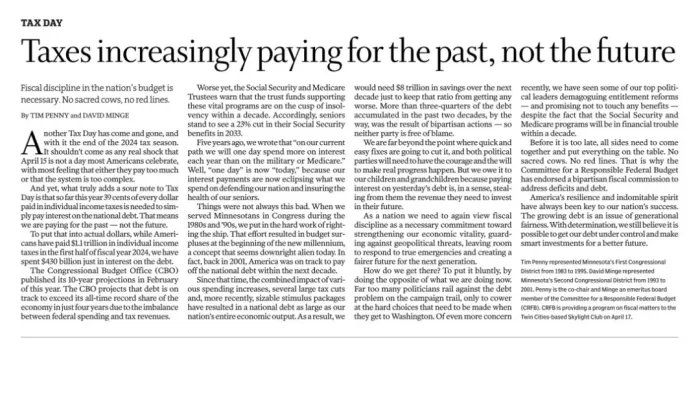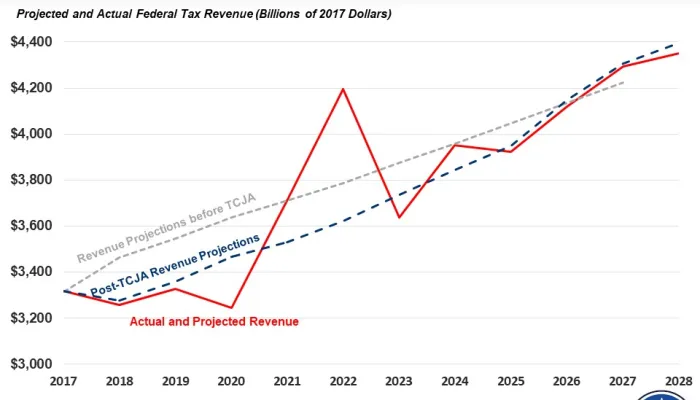Maya MacGuineas: GOP Considering a Half-Trillion-Dollar Tax-Reform Trick
Maya MacGuineas is president of the nonpartisan Committee for a Responsible Federal Budget and head of the Campaign to Fix the Debt. She recently wrote an opinion piece for The Hill newspaper. It is reposted here.
Washington has a history of budgetary magic tricks — move money around enough, borrow from this to pay that, and it is hard to keep track of spending and easy to claim fiscal victory. Accounting gimmicks have put bottom lines in-line on paper for decades, all while creating huge and damaging deficits.
Tax reform may turn out to be no different.
House Speaker Paul Ryan (R-Wis.) and Senate Majority Leader Mitch McConnell (R-Ky.) have said tax reform should be revenue-neutral, meaning the plan raises as much money as the current tax code.
As a strong proponent of pro-growth tax reform, I would completely agree. With debt at near record levels, now is not the time to be adding to it.
Revenue neutrality is more than a preference — budget reconciliation rules that allow a plan to pass with a simple majority in the Senate also require it. No plan can add to the debt outside the 10-year budget window under the rules.
But as is so often the case with budgeting, it all comes down to the baseline, and for tax reform to be revenue neutral, the first question is: compared to what?
Many lawmakers are considering a sleight of hand that would assume many tax cuts that are slated to expire would be continued. This in turn makes “revenue neutral” tax reform easier, since letting those tax cuts expire as planned could then generate “savings, or conversely, keeping them would suddenly be free. All told this trick of assuming tax cuts creates wiggle room of a whopping $462 billion — or over $500 billion if counting interest costs.
More and more arguments are popping up in favor of this approach of using this current policy baseline, rather than the more standard current law baseline. One argument is that the current policy approach is more realistic. Many of these expiring provisions are likely to be extended, so assuming they are is merely a nod to reality.
No question, Congress often extends expiring tax provisions without offsetting the costs. Every time it does so, it worsens the nation’s fiscal position. The last big bill added more than $800 billion to the debt!
Just because Congress tends to be fiscally reckless doesn’t mean we should build a budget process more accommodating of the irresponsibility. Quite the opposite in fact.
This argument for a policy baseline being more realistic is especially weak this time since the 2015 PATH Act specifically scheduled the temporary tax breaks under discussion to expire.
At the time, Chairman Orrin Hatch (R-Utah) described the PATH Act as “putting an end to the repeated tax extenders exercise that has plagued Congress for decades.” The intention was most certainly not to keep these tax breaks in place.
Another argument is that the budget baselines treat taxes and spending differently, building spending extensions into the baseline but not tax cuts. While there are some exceptions, for the most part the asymmetry is not between taxes and spending, but between policies where the cost of extending the legislation was included in the original score of the legislation and where it was not.
Many extenders exist because they were assumed to expire to make the tax cut look cheaper at the time it passed. Assuming its continuation incentivizes more of this costly game playing.
It is already happening. If Congress ends up passing a tax reform package that assumes some of the tax cuts expire before the end of the 10-year window, as they are considering to make it comply with reconciliation, you can bet when the time comes, politicians will argue they should be extended — for free of course. Voilà, a full new set of potentially budget-busting tax extenders will have been created.
The bottom line is that advocates of using a current policy baseline like it because it makes tax reform easier — not better for the tax code or for growing the economy; just politically easier.
No one in Congress these days seems willing to talk about paying for much of anything. But with the debt approaching unprecedented levels, this fiscal free-lunch approach to just about everything is going to have to change.
There are many ways to pay for tax reform so it doesn’t add to the debt. We can reduce and reform the over $1.5 trillion in yearly tax breaks (there has been some encouraging talk from the White House about doing this); we can create a new revenue stream (I favor a carbon for corporate tax trade) or we can cut spending.
One of the biggest ironies of this tax cut versus tax reform debate is how none of the supposed small-government proponents are suggesting spending cuts to pair with the tax cut as offsets, which from their perspective, should be a two-fer.
As the saying goes: If something is worth doing, it’s worth paying for. Real tax reform is absolutely worth doing, and we should pay for it instead of engaging in baseline gymnastics just to pass the bill onto our kids.
"My Views" are works published by members of the Committee for a Responsible Federal Budget, but they do not necessarily reflect the views of all members of the Committee.


